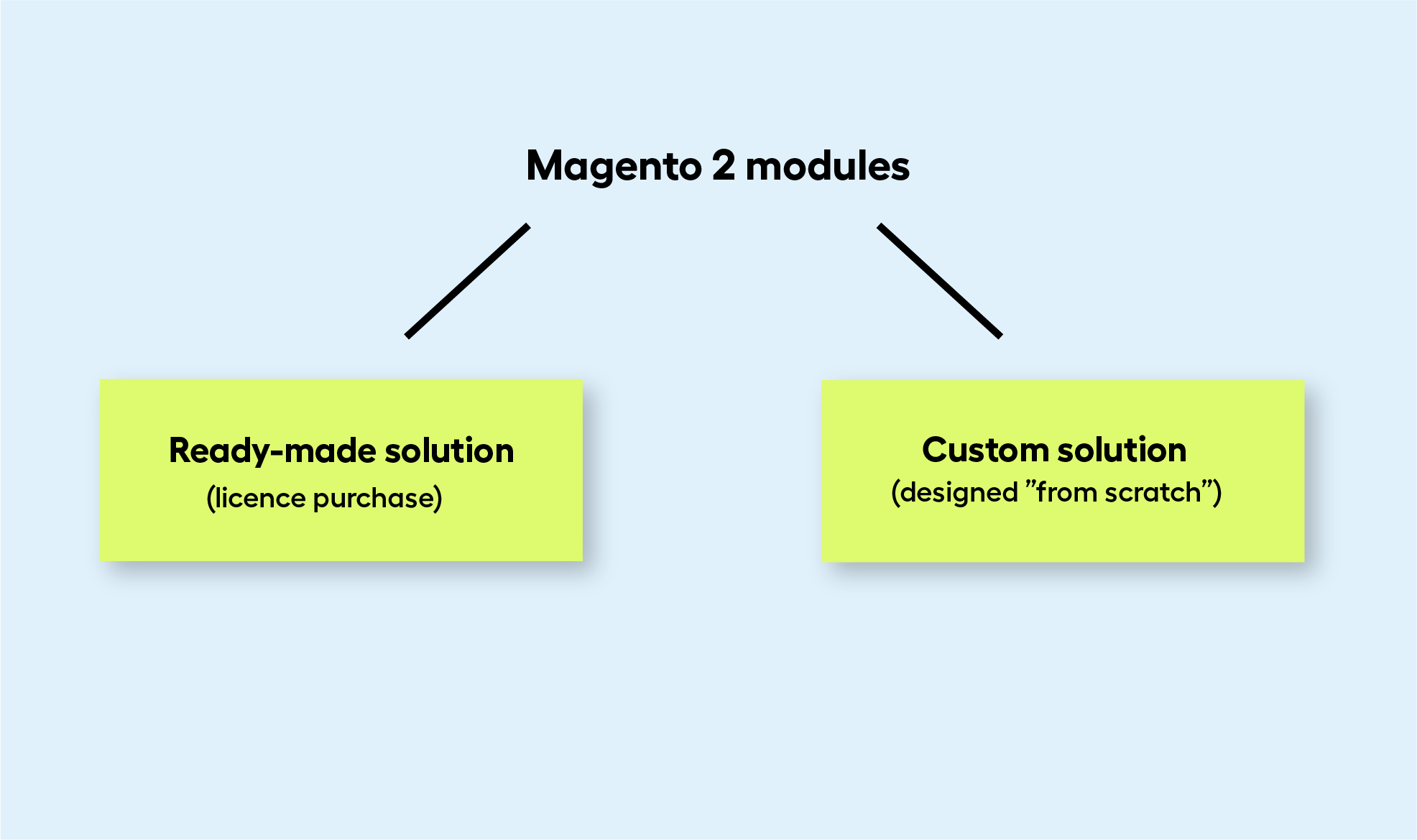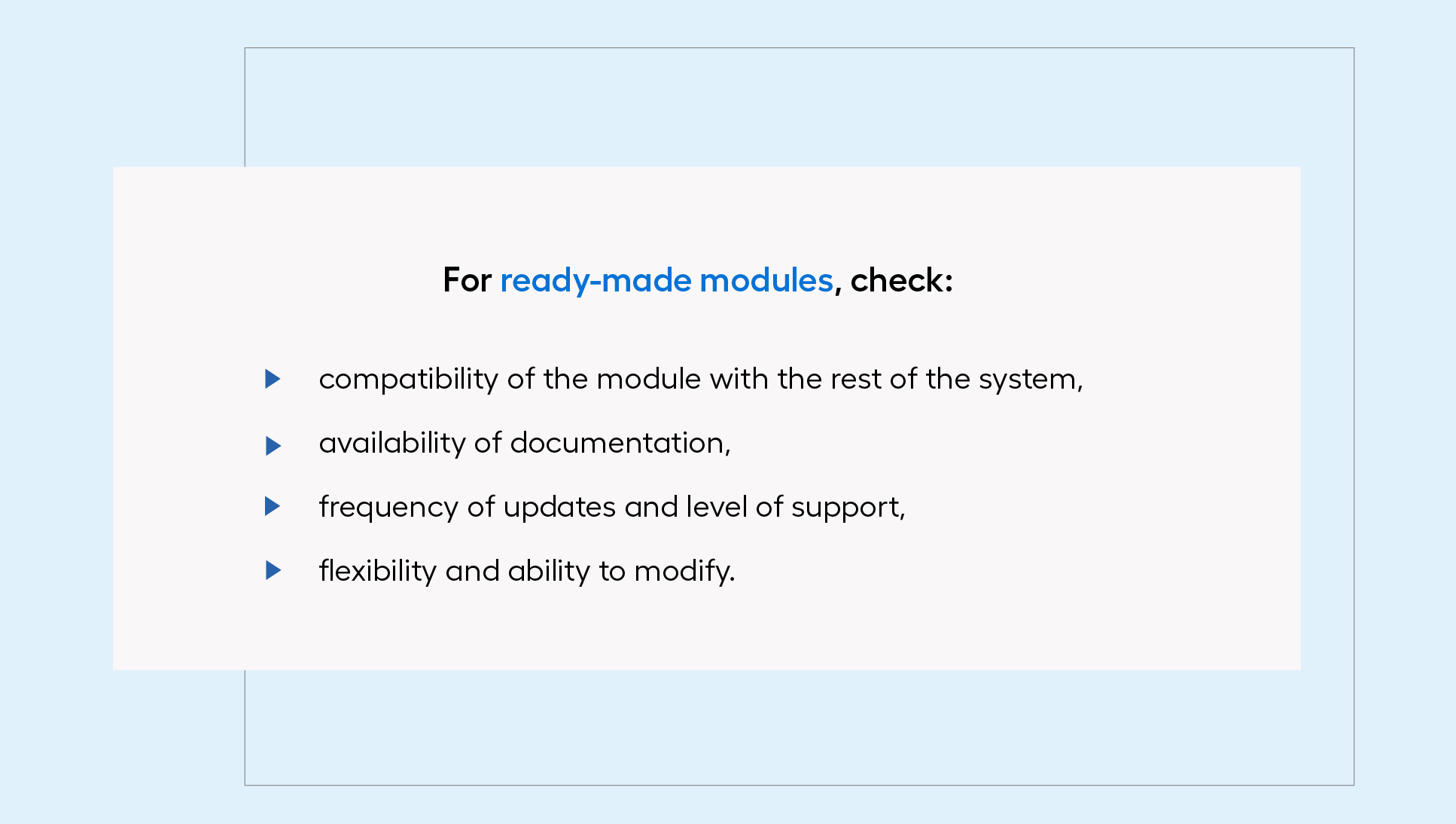Table of content:
- What are Magento modules and why are they used?
- Which types of modules are there for Magento 2?
- Ready-made module vs custom-built - which is better?
- Ready-made Adobe Commerce modules - what else should you pay attention to?
- How to take advantage of modules in an e-store?
- Choose modules and customise your online store to meet your needs
What demonstrates the flexibility of Adobe Commerce (formerly Magento)? The basic version of the engine provides a solid foundation on which you can build your store according to your vision, and what's more, at your own pace. The key to all of this lies in modules—add-ons that allow you to extend the functionality of your store. What makes them so powerful? Find more practical knowledge on this topic in this article - read on!
What are Magento modules and why are they used?
Magento modules are standalone code components that can be configured within the eCommerce platform. They enable store owners to add new features, modify existing processes, and optimise the management of their online store. With modules, you can integrate additional payment systems, automate marketing activities, personalise product offerings, and improve the performance and security of your store. This allows for the creation of unique solutions tailored to specific business needs.
Which types of modules are there for Magento 2?
How many Magento modules do you think are available on the market? The number of ready-made modules can reach hundreds of thousands, but that’s not all. Adobe Commerce system modules can also be created from scratch, meaning the only limitations are technological capabilities and imagination. Thus, modules can be divided into two main categories:
- Ready-made modules – these are available within the Adobe Commerce library as well as directly from vendor websites. They are designed to meet universal eCommerce needs, but more advanced modules can also be found (if someone has encountered a similar problem before, an appropriate solution likely already exists). Ready-made modules are usually paid (require purchasing a licence), and their prices can vary depending on the complexity of the solution.
- Custom-built modules – these are custom-developed, usually by software houses for specific projects. They offer complete flexibility in tailoring to the specific needs and structure of the platform. This solution requires more effort, often involving many hours of development work, which translates to higher costs. However, in return, you receive code that is fully tailored to your requirements and compatible with the existing site.
Additionally, besides paid commercial modules, the extensive developer community around Adobe Commerce means that free modules can also be found online. However, it’s important to remember that free versions may not be regularly updated, which can affect their security and functionality.

Ready-made module vs custom-built - which is better?
When deciding on modules for your eCommerce, one of the first decisions you'll need to make is choosing between a ready-made solution and commissioning a custom-built module. What should you choose?
At this point, you need to consider several factors. First and foremost, the choice depends on the functions you want to implement. If you need basic functionalities, such as integration with popular payment systems, product catalogue management, or basic SEO optimization, a ready-made module may be sufficient. In such a situation, a proven solution available on the market will likely meet your expectations.
However, if you require more advanced features that are not available in ready-made solutions, you will need to consider creating a custom-built module. An example could be advanced personalization - here, a custom module may better meet specific business needs.
It's always wise to consult with an experienced software house. Especially in the case of ready-made modules, specialists can help assess whether a given solution will meet your requirements and be compatible with the rest of your store's system. It's also worth noting that some software houses have their own libraries of ready-made modules, which can be more economical than creating a module from scratch, while still fitting better into the entire system than a product from an external vendor.
Ready-made Adobe Commerce modules - what else should you pay attention to?
Choosing the best ready-made Magento module can be challenging given the vast number of available options. The key criterion should be module compatibility, as different vendors may create code in various ways, leading to discrepancies and integration issues. Therefore, it’s crucial to thoroughly check whether the modules you plan to install are compatible with each other and work well with other system elements.
Another important aspect is the module documentation. Well-prepared documentation should include detailed instructions, implementation guidelines, and best practice tips. A lack of proper documentation can significantly complicate the implementation and configuration process.
Security is also a crucial factor. Modules that are regularly updated and supported by their vendors are more likely to quickly respond to new threats and security vulnerabilities. When choosing a module, ensure that the vendor has a good reputation for security and promptly addresses reported issues.
Finally, consider the flexibility and customization capabilities of the module. Even if you initially opt for a ready-made solution, over time, you may need to tailor it to specific business requirements. Modules that are well-written and documented are generally easier to modify, allowing for better adaptation to the unique needs of your eCommerce. By selecting modules that meet these criteria, you can ensure a solid foundation for the growth and management of your online store.

How to take advantage of modules in an e-store?
It's worth emphasising once again - using modules allows you to add practically any function to your online store. This includes both minor functionalities that significantly improve the shopping experience (e.g., the ability to add a gift to an order or automatically include free shipping after exceeding a certain amount) and more complex solutions (e.g., dynamically personalising homepage content based on user behaviour analysis).
Where else can modules be used in an online store? Here is a list of the most commonly enhanced areas in eCommerce with specific examples:
- Managing the purchasing process: integrations with couriers, various payment methods, returns management, one-step checkout, compliance with the Omnibus Directive or GDPR;
- Automation: modules for automating processes can include inventory management, automatic stock notifications, or dynamic pricing management;
- Marketing tools: modules supporting marketing campaigns, newsletters, promotions, email campaigns, or integrations with advertising platforms;
- Customer relations: loyalty programs, chatbots, offer personalization, customer review and rating systems;
- SEO: modules that help optimise the store for search engines, manage meta tags, create friendly URLs, and sitemaps;
- International expansion: support for multiple languages, various currencies, compliance with local legal regulations, and local payment methods.
Choose modules and customise your online store to meet your needs
Magento modules offer almost unlimited possibilities for expanding and personalising an online store. They allow for gradual and flexible introduction of new functionalities, which is crucial in the dynamically changing eCommerce environment.
Use their potential to create an online store that not only meets but exceeds your customers' expectations, contributing to increased sales and user satisfaction. Experiment with modules, but remember that it's best to implement them one at a time whenever possible. This approach allows for thorough testing and evaluation of each module's impact on sales levels and customer satisfaction. Monitoring the effects of implementing individual features enables informed decisions regarding future investments in store development.
Are you considering enhancing your store with additional functionalities? In our over 15-year career, we have implemented hundreds of modules for our clients - contact us, and we’ll be happy to help!



